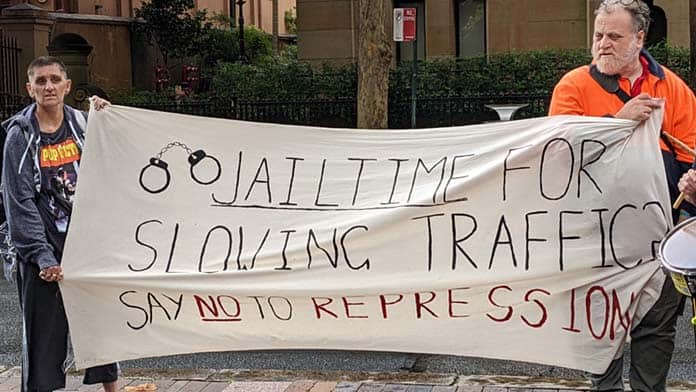New laws in NSW rushed through on 1 April are an appalling attempt to criminalise activism and protest at a time when it is deeply needed.
Anyone disrupting or damaging major roads or “a major facility” (including train stations, ports, and other public and private infrastructure) faces fines of up to $22,000 and two years in jail under changes introduced by Liberal Premier Dominic Perrottet.
The legislation gives the government the power to “prescribe” any road or facility to which the laws will apply.
Just days after they passed parliament, it listed common protest locations including Town Hall and more than 40 other train stations, as well as George Street, Oxford Street, Lee Street and Taylor Square as areas affected.
This would criminalise protests that block any of the entrances to Town Hall train station or that block roads commonly used for protest marches.
Greens MP David Shoebridge warned that, “We have all seen what happens when police have the power to veto protests in Moscow and Beijing, now they have been given that same power of veto and arrest at Sydney Town Hall.”
Shamefully, the changes passed with the support of the Labor Party, despite the opposition of the Greens, civil society groups and the union movement.
The head of Unions NSW, Mark Morey, called the bill “unacceptable”, and called on parliament to “pause and reconsider”. MUA Sydney Branch secretary Paul Keating added that it “risks subjecting workers and community members standing up for their rights to jail time and severely restricting the space for union activity”.
As a result of union pressure, industrial actions and industrial campaigns, as well as protests outside parliament or an MP’s office, were all excluded from the new laws. But the MUA and other unions have continued to oppose the laws in their entirety.
The changes have created uncertainty about the impact on all kinds of protest activity. It appears that protest marches would still be legal where organisers have notified police at least seven days in advance, under existing law in the Summary Offences Act, won as a result of the right to march campaign in NSW following the first Mardi Gras in 1978.
But the threat to the right to protest is still very real. Snap protests held at less than seven days’ notice would face the new penalties, as could rallies where police challenge a march route in the Supreme Court.
Blockades
This attack on the right to protest is a right-wing law-and-order response to a series of actions by Blockade Australia, which disrupted access to Sydney’s Port Botany for five days at the end of March. Another climate activist group, Fireproof Australia, has also blocked major roads during peak-hour traffic.
These actions are a cry of rage against the climate catastrophe we are facing, designed to disrupt the port and the wider economy in the hope that direct action protests will produce change.
Even before the new laws were passed, activists have already faced a draconian response. Max, who blocked the loading of a ship at the port for five hours, was sentenced to four months’ jail and a $1500 fine. He is appealing the sentence but has been denied bail.
Two other activists involved, brothers from Germany, have had their visas cancelled. One has already been deported while the other is in Villawood detention centre until his next court appearance in May, with NSW Acting Premier Paul Toole declaring, “If he can’t abide by our laws, he can go back to Germany because he isn’t wanted here.”
The real criminals are the politicians and companies profiting from the destruction of the planet, whose actions are putting millions of lives and entire eco-systems at risk, not the activists trying to stop this.
Just days after the laws were passed, UN Secretary-General Antonio Guterres slammed governments for “a litany of broken climate promises”, detailed in a new report from the Inter-governmental Panel on Climate Change, that have “put us firmly on track toward an unlivable world”. He warned that “we are speeding toward disastrous global warming of more than double the limit of 1.5 degrees Celsius” agreed to at global climate summits.
The NSW and federal governments are working hand in hand with the climate criminals responsible, allowing a dramatic expansion of coal and gas mining when the need to phase out fossil fuels is beyond urgent.
The new laws are the latest in a growing effort to criminalise protest throughout the country. Similar laws were introduced in Tasmania in 2014, only to be defeated in the High Court in 2017, which found that they directly targeted the implied freedom of political expression in the Constitution. This decision reflects the essential nature of protest to any democracy.
We can’t accept this attack on the right to protest. The climate movement, unionists and other activists must unite to defend all those charged using these new laws and keep asserting our right to demonstrate and demand change.
By Angus Dermody






